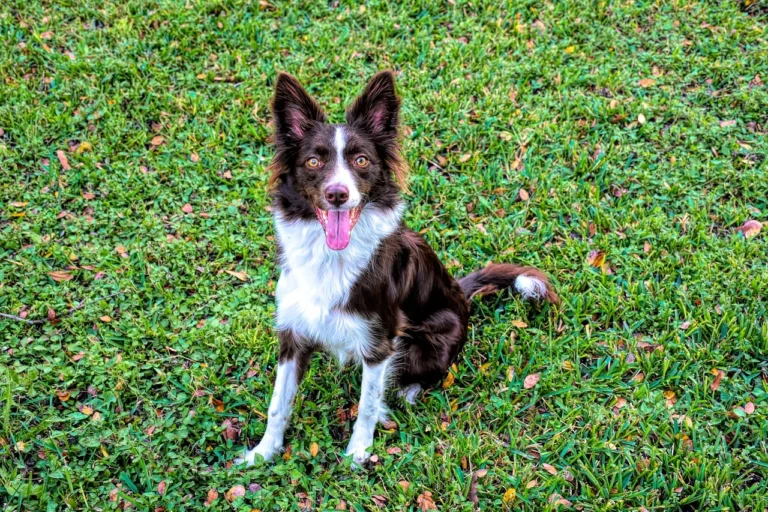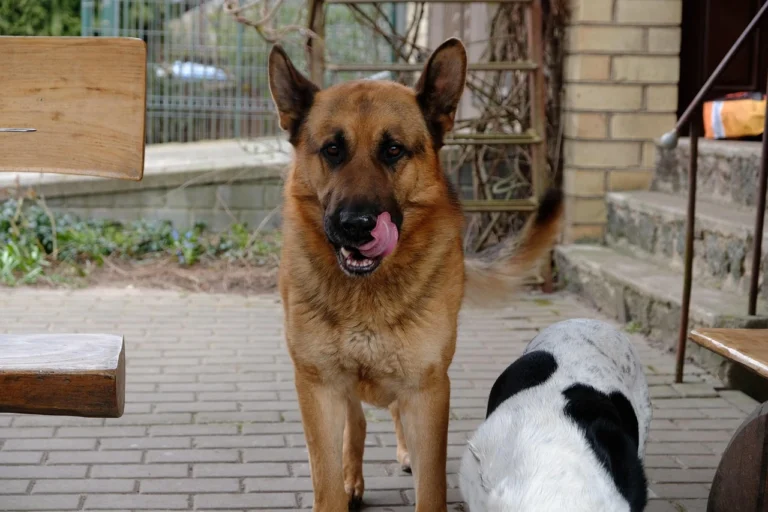Is Applesauce Good for Dogs? Safe Feeding Guide
As a devoted dog parent, I’ve always wondered about treats for my furry friend. Many pet owners ask, “Is applesauce good for dogs?” They look for safe, nutritious snacks for their pets.
Dogs are curious and often want to try our food. But, can dogs eat applesauce? The answer is not just yes or no. Every dog is different, and knowing how to introduce new foods is key for their health.
This guide will cover everything about giving applesauce to your dog. We’ll look at the good and bad sides of this sweet treat. You’ll learn how it can be a safe part of your dog’s diet.
If you want to mix up your dog’s treats or find a healthy option, knowing about applesauce is important. Let’s explore dog-friendly nutrition. We’ll see if this simple fruit treat could become your dog’s new favorite.
Table of Contents
Understanding Applesauce and Its Basic Components
Applesauce is a tasty treat that might interest dog owners. It’s a fruit-based snack that needs careful thought before giving to your pet.
When looking at applesauce for your dog, knowing what’s in it is key. Different types and brands have different ingredients.
Types of Applesauce Available
Dog owners can find many applesauce types:
- Unsweetened plain applesauce
- Organic applesauce
- Sweetened commercial varieties
- Homemade applesauce
Common Ingredients in Commercial Applesauce
Not all applesauce is the same. When picking applesauce for a dog with an upset stomach, look at the ingredients. Common things include:
- Apples
- Water
- Ascorbic acid (Vitamin C)
- Cinnamon (in some varieties)
Natural vs. Artificial Sweeteners
Choosing the right applesauce for your dog is important. Natural sugars from apples are generally safer than artificial ones. Artificial sweeteners can harm dogs.
Xylitol is a bad artificial sweetener for dogs. It’s very toxic. Always check labels to keep your dog safe.
Is Applesauce Good for Dogs: Safety and Benefits
Wondering if applesauce is good for dogs? It’s important to think it over. Plain, unsweetened applesauce can be a safe and tasty treat for dogs. It’s not just a snack; it has real benefits.
When looking into whether applesauce is good for dogs, there are key things to remember:
- Choose unsweetened, plain applesauce
- Avoid varieties with added sugars or artificial sweeteners
- Introduce in small quantities
- Monitor your dog’s reaction
Applesauce has nutrients that can help your dog’s health. It has vitamins and minerals that support wellness. Its soft texture is also good for dogs with sensitive stomachs.
But, safety is always the top concern. Always talk to your vet before adding new foods to your dog’s diet. Some dogs might not be able to handle applesauce due to allergies or sensitivities.
Remember: Moderation is key when feeding applesauce to your furry friend.
Give small amounts and watch for any odd reactions. A teaspoon or two now and then can be a nice, healthy treat for your dog.
Nutritional Benefits of Applesauce for Canines
Applesauce is a tasty and healthy snack for dogs. Knowing the benefits helps pet owners choose the best food for their pets. This supports their health and happiness.
Vitamin and Mineral Powerhouse
Apples are full of nutrients that are good for dogs. Applesauce gives dogs a boost with vitamins and minerals. These help keep them healthy:
- Vitamin C for immune system support
- Vitamin A for eye and skin health
- Potassium for muscle and nerve function
- Antioxidants to fight free radicals
Digestive Health Support
Applesauce is gentle on dogs with upset stomachs. It has lots of fiber to help digestion. Pectin, a fiber in apples, helps with bowel movements and stops loose stools.
Hydration and Refreshment
Dogs need to drink more water, and applesauce helps. It’s full of water, making it great for hot weather or dogs who don’t drink enough.
Pro tip: Always choose unsweetened, plain applesauce to avoid unnecessary sugars and additives.
Start with small amounts of applesauce in your dog’s diet. Watch for any bad reactions. The benefits are big when given in the right amount.
Potential Risks and Side Effects of Feeding Applesauce
Before giving applesauce to your dog, it’s important to know the risks. Not all applesauces are safe for dogs. Some can be very harmful.

- Artificial Sweeteners: Xylitol, a common sweetener, is extremely toxic to dogs and can cause rapid insulin drop and potential liver failure
- High Sugar Content: Excessive sugar can lead to weight gain and dental issues
- Digestive Upset: Large quantities might trigger stomach problems
It’s key to understand the risks of different applesauces when asking “can dogs eat applesauce.”
| Applesauce Type | Risk Level | Potential Consequences |
|---|---|---|
| Sweetened Commercial | High | Weight gain, dental problems |
| Xylitol-containing | Extreme | Potential insulin shock, liver damage |
| Unsweetened Plain | Low | Minimal risk when given in moderation |
Look out for signs of upset stomach after giving applesauce, like vomiting or diarrhea. Always talk to your vet before adding new foods to your dog’s diet.
Safe Serving Sizes and Frequency Guidelines
Feeding applesauce to dogs needs careful thought about how much and how often. Knowing the right amount helps keep your dog healthy and happy.
When thinking about applesauce for dogs, it’s all about the right amount. It’s important to keep it in moderation and know what your dog needs.
Portion Recommendations by Dog Size
Dogs of different sizes need different amounts of applesauce:
- Small Dogs (under 20 lbs): 1-2 teaspoons per serving
- Medium Dogs (20-50 lbs): 2-3 teaspoons per serving
- Large Dogs (50+ lbs): Up to 1-2 tablespoons per serving
Weekly Feeding Limitations
Don’t overdo it with applesauce to avoid stomach problems and keep a balanced diet. Experts suggest:
- Give applesauce 2-3 times a week
- Don’t go over 1/4 cup a week
- Always pick unsweetened, plain applesauce
Signs of Overconsumption
Look out for these signs that your dog might be eating too much applesauce:
- Digestive upset or diarrhea
- Less interest in food
- Unusual weight gain
- Changes in stool consistency
Every dog is different. Talk to your vet to figure out the best way to feed applesauce to your dog.
Choosing the Right Applesauce for Your Dog
Is applesauce safe for dogs to eat? The answer depends on the type you choose. Not all applesauces are safe for dogs. Some can even be harmful.
To keep your dog safe, look for these important features:
- Choose unsweetened applesauce with few ingredients
- Opt for organic apples to avoid pesticides
- Make sure there are no artificial sweeteners
- Look for applesauce without preservatives
Looking for a safe applesauce substitute? Here are some options:
- Fresh, pureed apples
- Homemade unsweetened apple puree
- Commercial dog-specific apple treats
- Plain cooked apple pieces
Always check the ingredients to avoid health problems. Stay away from applesauce with:
- Added sugars
- Xylitol
- Artificial preservatives
- Too much cinnamon
Talk to your vet about adding applesauce to your dog’s diet. They can help make sure it’s right for your dog’s needs.
How to Make Homemade Dog-Safe Applesauce
Making homemade applesauce for dogs is a fun and healthy treat. You get to choose the ingredients for the best nutrition.
Choosing the right apples is key. Pick dog-safe varieties like Gala or Fuji. Avoid seeds and cores, as they can harm dogs.
Ingredients and Preparation
- 4-5 fresh, organic apples
- Small amount of water
- Optional: Cinnamon (dog-safe spice)
Step-by-Step Preparation Guide
- Wash apples thoroughly
- Peel and remove seeds
- Chop apples into small chunks
- Cook with minimal water until soft
- Mash or blend to desired consistency
- Cool completely before serving
Storage Tips
Keep your applesauce in an airtight container. Refrigerate for up to a week or freeze in small portions. Always check for spoilage before serving.
Pro tip: Use glass containers for better preservation and to avoid potential chemical leaching from plastic.
Creative Ways to Serve Applesauce to Your Dog
Feeding applesauce to dogs can be fun! You can turn this healthy treat into exciting meals for your furry friend. Try frozen treats or homemade recipes to make mealtime fun.

- Frozen Applesauce Cubes: Perfect for hot summer days
- Applesauce as a Meal Topper: Add flavor and nutrition to regular dog food
- Homemade Applesauce Dog Treat Recipes: Bake or no-bake options
Here are some fun ways to add applesauce to your dog’s diet:
- Frozen Applesauce Popsicles
Make refreshing frozen treats with ice cube trays. Just pour unsweetened applesauce into trays and freeze for a cool snack.
- Applesauce Stuffed Toys
Fill puzzle toys or Kong-style containers with a bit of applesauce. It’s a tasty reward and fun challenge for your dog.
“Creativity in feeding can make mealtime an exciting adventure for your dog!” – Veterinary Nutrition Experts
When trying new applesauce dog treat recipes, keep these tips in mind:
| Tip | Description |
|---|---|
| Use Unsweetened | Avoid applesauce with added sugars or artificial sweeteners |
| Moderation | Limit applesauce to small portions of your dog’s diet |
| Variety | Rotate different serving methods to keep things interesting |
Being creative with applesauce can make mealtime fun and nutritious for your dog.
Using Applesauce for Dogs with Special Dietary Needs
Dog owners look for healthy food options for their pets. Applesauce is a good choice for dogs with special needs. It’s easy to digest and can help with health issues.
For dogs with sensitive stomachs, choosing the right food is important. Applesauce is a gentle option. It’s full of nutrients and easy to digest.
Digestive Issues and Recovery
When your dog has digestive problems, picking the right food is key. Applesauce has many benefits:
- It has a smooth texture that’s easy on the stomach
- Natural pectin helps firm up loose stools
- It keeps your dog hydrated during recovery
- It’s low in fat, great for sensitive stomachs
Weight Management Options
Applesauce can also help with weight management. Here are some tips:
- Choose unsweetened applesauce for a low-calorie treat
- Swap high-calorie snacks for small applesauce portions
- Mix applesauce with lean proteins for balanced meals
Always talk to your vet before changing your dog’s diet.
Nutrition is key to supporting your dog’s health and recovery.
Conclusion
Looking into whether dogs can eat applesauce shows it’s more than just a yes or no. Apples are good for dogs if given the right way. Knowing the right applesauce and how much is key to keeping your dog healthy.
When thinking about applesauce for dogs, talking to a vet is essential. Every dog is different, so a vet can help make sure it’s safe. Plain, unsweetened applesauce is best for your pet’s health.
It’s important to watch how your dog reacts to new foods. Start with a little and see if there are any problems. Remember, applesauce is a treat, not a main food.
With the tips from this guide, you can give your dog a yummy treat. Just remember to keep it in moderation, choose the best quality, and watch for any signs of trouble.







